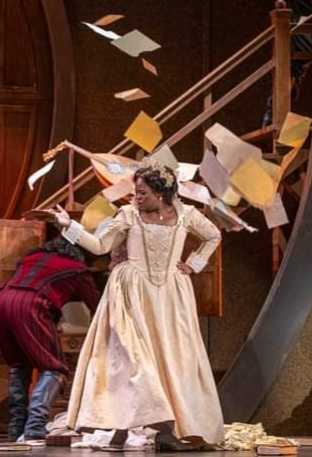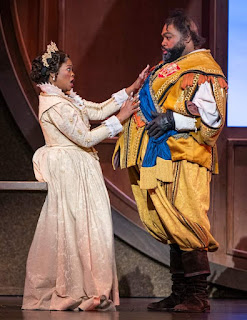Opera San Jose
Falstaff
February 11, 2023
 |
| Chanae Curtis as Alice Ford. |
Opera San Jose’s production of Verdi’s final opera is a madly entertaining evening, thanks to a superb cast, a repurposing of Steven C. Kemp’s imaginative 2013 set design, and a high level of comic energy under stage director Jose Maria Condemi. All of which serves to underscore the brilliance of an opera that is probably not performed as often as it should be.
It all begins with our titular character, of course, and baritone Darren Lekeith Drone is perfection. He carries the big man’s great lusty presence, mints comic currency from his delusional confidence and problematic anatomy, and even makes us feel his pain, railing against the suggestion that he should give in to age and fat-shaming. (Coming from an 80-year-old composer, these are salient points.)
Sir John is assisted in his shenanigans by two able comedians, bass-baritone Andrew Allan Hiers as the lumbering Pistola and tenor Marc Molomot as the troll-like Bardolfo. Molomot’s exaggerated tremblings before his lord’s lectures are hysterically funny.
 |
| Chanae Curtis as Alice Ford, Darren Lekeith Drone as Falstaff. |
The vocal delights are plentiful, starting with the potent soprano of Chanae Curtis as Alice Ford. Curtis’s instrument is lyric but strong, notably in the many marcato passages that run through Alice’s part (befitting her role as the female ring-leader). Playing Dr. Caius, the standard old-dude-your-dad-wants-you-to-marry, Zhengyi Bai exhibited a gorgeous lirico spinto tenor. Let’s hope he returns in some lead roles. (Bai also has the best costume, an elegant concoction of black andsilver from Sarasota Opera.)
The most memorable performance comes from baritone Eugene Brancoveanu, who’s always been one of my favorites but has outdone himself as Ford. Convinced (mistakenly) that his wife actually means to have a tryst with the bloated Falstaff, Ford launches into a full-blown tirade, beginning with the cuckold’s arioso, “E sogno?” The music swings into the language of dramatic opera and Brancoveanu dives in head-first, conveying Ford’s anger with a thrilling intensity, both vocally and dramatically.
The fullness of this anger pays comic dividends in the following scene, when Ford and his men ransack his house like FBI agents looking for classified documents. The genius stroke from Condemi is how Ford’s men go through every last drawer, throwing papers around like jumbo confetti, even though they’re searching for a 300-pound man who would probably not fit into such small spaces. It’s all completely absurd, except that papers flying all over the place is just really freakin’ funny. At the end of the scene, as they approach their quarry (which is actually Ford’s daughter necking with her boyfriend), they hold up their cabinet drawers like riot shields.
As masterworks do, Falstaff reveals more and more of its brilliance on further viewings. It may take until I’m eighty years old before I completely understand all its machinations. This time, the revelation came in a moment when the four female conspirators were hiding by the stairwell as four male conspirators gathered downstage. Each and every one of these eight singers had their own vocal line, going off all at once, and still, it all made sense, like a great operatic cantata. It’s as if, after eight decades of developing new skills, Verdi needed exactly such a many-charactered farce to provide him with the necessary challenges. It’s wonderful to imagine an 80-year-old artist so open-minded and energized that he’s helping to push opera into a new idea like through-composing, the erosion of the walls previously placed between set pieces (arias, choruses, etc.). (Compare this to your older friends who won’t even listen to a song recorded after 1980.)
Kemp’s set was placed into a stage-wide wine barrel, which gives the opera a certain Alice (Ford) in Wonderland surreality. Having seen a few conductors who lack this quality, I was struck by Joseph Marcheso’s ability to negotiate the space between singers and orchestra, particularly in a moment when he waited for soprano Natalia Santaliz to finish a long sustenato before cuing his players. This is such a valuable skill.
I truly enjoy the little accidents of stage business, and a scene between Falstaff and Mistress Quickly (Megan Esther Gray) provided a choice example. Gray’s top hat went flying off during an emotional passage and sat there on the floor as she (rightly) concentrated on her rather involved vocal work. But Drone found a moment in Falstaff’s blocking to return it to her. She placed it back on her head, and, a minute later, it flew off once more.
Through February 26 at California Theater, 345 S. First Street, San Jose. $55-$195, www.operasj.org, 408/437-4450.
Michael J. Vaughn is a 35-year opera critic and author of 28 novels, including Gabriella’s Voice and Operaville, available at Amazon.

